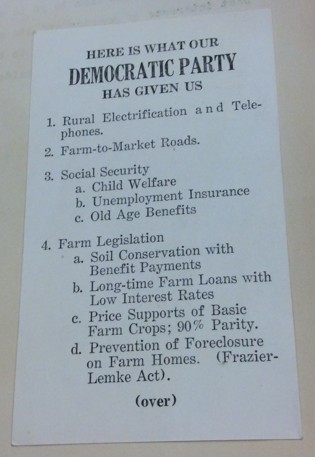Bonen no Max'd
Banned
http://www.theatlantic.com/politics/archive/2016/10/how-democrats-killed-their-populist-soul/504710/
This article is a bit old and came out before the election but is a really interesting and enlightening look at the divide between the populist and elitist factions of the Democrats and the roots of the current division.
Hopefully this isn't too quote heavy, I found this article fascinating and really recommend reading the entire thing.
This article is a bit old and came out before the election but is a really interesting and enlightening look at the divide between the populist and elitist factions of the Democrats and the roots of the current division.
The Watergate Babiesas the recently elected Democratic congressmen were knownwere young, idealistic liberals who had been swept into office on a promise to clean up government, end the war in Vietnam, and rid the nations capital of the kind of corruption and dirty politics the Nixon White House had wrought. Richard Nixon himself had resigned just a few months earlier in August. But the Watergate Babies didnt just campaign against Nixon; they took on the Democratic establishment, too. Newly elected Representative George Miller of California, then just 29 years old, announced, We came here to take the Bastille.
One of their first targets was an old man from Texarkana: a former cotton tenant farmer named Wright Patman who had served in Congress since 1929. He was also the chairman of the U.S. House Committee on Banking and Currency and had been for more than a decade. Antiwar liberal reformers realized that the key to power in Congress was through the committee system; being the chairman of a powerful committee meant having control over the flow of legislation. The problem was: Chairmen were selected based on their length of service. So liberal reformers already in office, buttressed by the Watergate Babies votes, demanded that the committee chairmen be picked by a full Democratic-caucus vote instead.
Ironically, as chairman of the Banking Committee, Patman had been the first Democrat to investigate the Watergate scandal. But he was vulnerable to the new crowd he had helped usher in. He was old; they were young. He had supported segregation in the past and the war in Vietnam; they were vehemently against both. Patman had never gone to college and had been a crusading economic populist during the Great Depression; the Watergate Babies were weaned on campus politics, television, and affluence.
Not all on the left were swayed. Barbara Jordan, the renowned representative from Texas, spoke eloquently in Patmans defense. Ralph Nader raged at the betrayal of a warrior against corporate power. And Californias Henry Waxman, one of the few populist Watergate Babies, broke with his class, puzzled by all the liberals who opposed Patmans chairmanship. Still, Patman was crushed. Of the three chairmen who fell, Patman lost by the biggest margin. A week later, the bank-friendly members of the committee completed their takeover. Leonor Sullivana Missouri populist, the only woman on the Banking Committee, and the author of the Fair Credit Reporting Actwas removed from her position as the subcommittee chair in revenge for her support of Patman. A revolution has occurred, noted The Washington Post.
The result today is a paradox. At the same time that the nation has achieved perhaps the most tolerant culture in U.S. history, the destruction of the anti-monopoly and anti-bank tradition in the Democratic Party has also cleared the way for the greatest concentration of economic power in a century. This is not what the Watergate Babies intended when they dethroned Patman as chairman of the Banking Committee. But it helped lead them down that path. The story of Patmans ousting is part of the larger story of how the Democratic Party helped to create todays shockingly disillusioned and sullen public, a large chunk of whom is now marching for Donald Trump.
Modern liberals tend to confuse a broad social-welfare state and redistribution of resources in the form of tax-and-spend policies with the New Deal. In fact, the central tenet of New Deal competition policy was not big or small government; it was distrust of concentrations of power and conflicts of interest in the economy. The New Deal divided power, pitting faction against other faction, a classic Jefferson-Madison approach to controlling power (think Federalist Paper No. 10). Competition policy meant preserving democracy within the commercial sphere, by keeping markets open. Again, for New Deal populists like Brandeis and Patman, it was democracy or concentrated wealthbut not both.
New Deal fears of bigness and private concentrations of power were given further ideological ammunition later in the 1930s by fascists abroad. As Roosevelt put it to Congress when announcing a far-reaching assault on monopolies in 1938: The liberty of a democracy is not safe if the people tolerate the growth of private power to a point where it becomes stronger than their democratic state itself. That, in its essence, is fascism. In 1947, Patman even commissioned experts to publish a book titled Fascism in Action, noting that fascism as a political system was the combination of extreme nationalism and monopoly power, a dictatorship of big business.
Competition policy was also a powerful political strategy. Democrats lost the U.S. House of Representatives just twice between 1930 and 1994. To get a sense of how rural Democrats used to relate to voters, one need only pick up an old flyer from the Patman archives in Texas: Here Is What Our Democratic Party Has Given Us was the title. There were no fancy slogans or focus-grouped logos. Each item listed is a solid thing that was relevant to the lives of conservative white Southern voters in rural Texas: Electricity. Telephone. Roads. Social Security. Soil conservation. Price supports. Foreclosure prevention.

Hopefully this isn't too quote heavy, I found this article fascinating and really recommend reading the entire thing.
